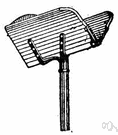hod
(hŏd)n.
1. A trough carried over the shoulder for transporting loads, as of bricks or mortar.
2. A coal scuttle.
3. A rectangular basket with sides made of wood slats or wire mesh, traditionally used by clammers to carry their catch.
[Perhaps alteration of dialectal hot, from Middle English, pannier, from Old French hotte, of Germanic origin.]
American Heritage® Dictionary of the English Language, Fifth Edition. Copyright © 2016 by Houghton Mifflin Harcourt Publishing Company. Published by Houghton Mifflin Harcourt Publishing Company. All rights reserved.
hod
(hɒd)n
1. (Building) an open metal or plastic box fitted with a handle, for carrying bricks, mortar, etc
2. (Furniture) a tall narrow coal scuttle
[C14: perhaps alteration of C13 dialect hot, from Old French hotte pannier, creel, probably from Germanic]
Collins English Dictionary – Complete and Unabridged, 12th Edition 2014 © HarperCollins Publishers 1991, 1994, 1998, 2000, 2003, 2006, 2007, 2009, 2011, 2014
hod
(hɒd)n.
1. a trough fixed crosswise on top of a pole held against the shoulder and used for carrying bricks, mortar, etc.
2. a coal scuttle.
[1565–75; perhaps later variant of Middle English hot basket for carrying earth]
Random House Kernerman Webster's College Dictionary, © 2010 K Dictionaries Ltd. Copyright 2005, 1997, 1991 by Random House, Inc. All rights reserved.
ThesaurusAntonymsRelated WordsSynonymsLegend:
| Noun | 1. |  hod - an open box attached to a long pole handle; bricks or mortar are carried on the shoulder hod - an open box attached to a long pole handle; bricks or mortar are carried on the shoulderbox - a (usually rectangular) container; may have a lid; "he rummaged through a box of spare parts" |
Based on WordNet 3.0, Farlex clipart collection. © 2003-2012 Princeton University, Farlex Inc.
Translations
Collins Spanish Dictionary - Complete and Unabridged 8th Edition 2005 © William Collins Sons & Co. Ltd. 1971, 1988 © HarperCollins Publishers 1992, 1993, 1996, 1997, 2000, 2003, 2005
Collins English/French Electronic Resource. © HarperCollins Publishers 2005
hod
n
(for bricks, mortar etc) → Tragmulde f
(= also coal hod) → Kohlenschütte (→ r m) f
Collins German Dictionary – Complete and Unabridged 7th Edition 2005. © William Collins Sons & Co. Ltd. 1980 © HarperCollins Publishers 1991, 1997, 1999, 2004, 2005, 2007